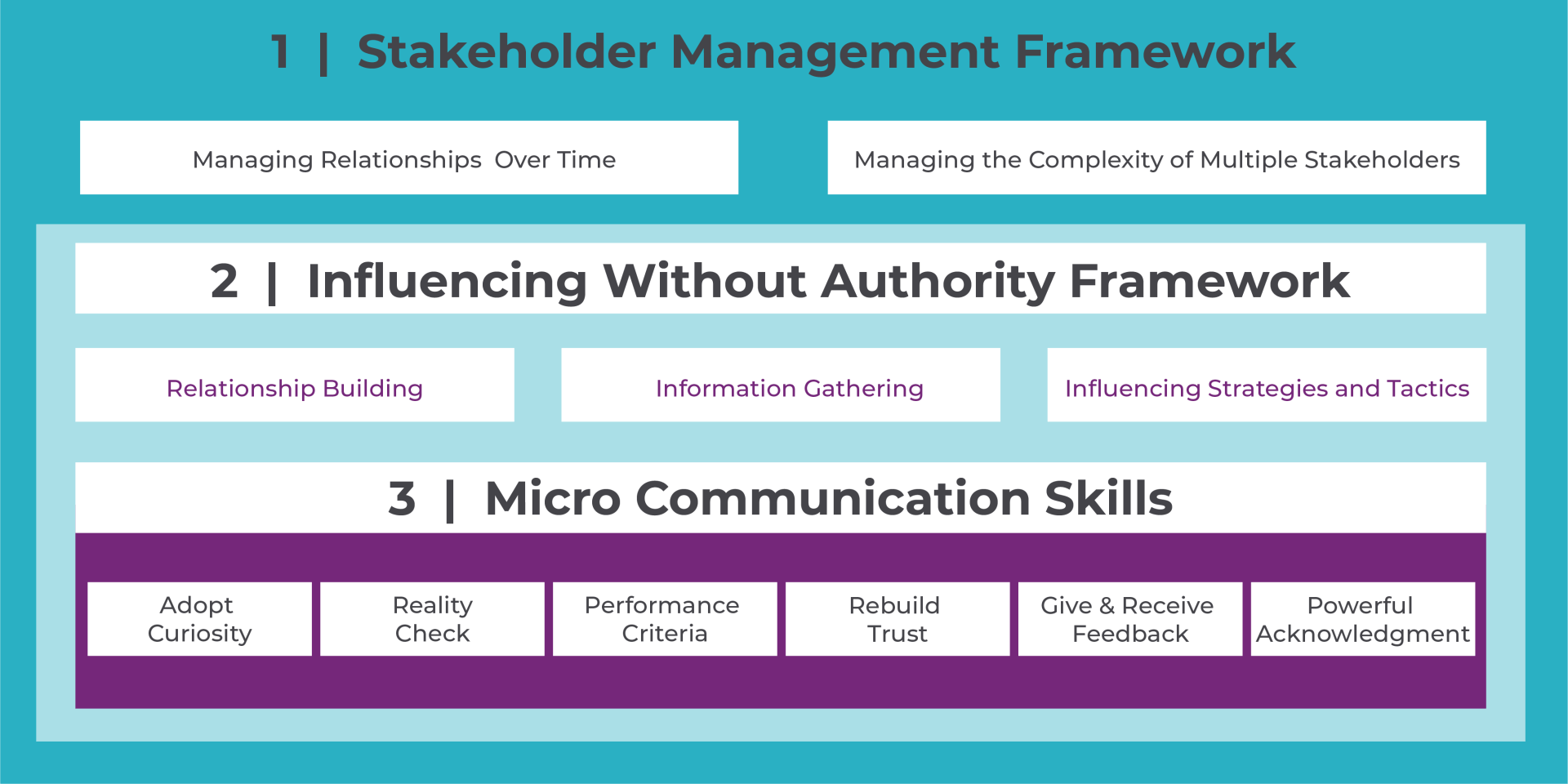Partnering Mastery
With Harthill
Acquire practical skills for partnering mastery.
The ability to effectively manage relationships with internal and external stakeholders is critical to your organisation’s success.
(You already know this.)
Some people are great at managing cross-functional relationships, while others... not so much.
(You already know this too.)
So what’s the secret sauce for being great at managing these important cross-functional relationships?
- Emotional intelligence
- People skills
- Communication skills
- Influencing skills
- Negotiation skills
- Strategic thinking
- Stakeholder management skills
But those are all rather fluffy terms.
How would you measure them? How can people build these skills? Are they innate, or can they be learned?
At Harthill, we have spent decades investigating what specific skills and tools it takes to create great relationships with your business partners.
And we’ve developed a training programme that makes those skills easy to learn and put into practice in real life situations.
Here are the key things we teach in this programme
- A small number of very specific Micro Communication Skills that can be used in almost any communication situation to build strong, trusting relationships
- A framework for Influencing Without Authority that can be used to develop strategies and plans for effectively influencing stakeholders
- A strategic Stakeholder Management Framework that can be used for strategic planning, tracking and ongoing management of complex multi-stakeholder situations
These are not vague concepts, and we don’t talk about philosophy or psychology in our programmes. They are all specific and learnable behaviours and frameworks. We focus entirely on the practical and actionable.
The tools and frameworks are carefully designed to fit together into a coherent whole, making them easy to learn, remember and apply in action.
The Micro Communication Skills
provide the foundation. Everything else is built on these.
The Influencing Without Authority Framework
addresses the most challenging influencing situation: where you don’t have any direct authority over stakeholders. It provides a framework for strategizing and planning how to influence stakeholders, along with practical tools and techniques to effectively influence stakeholders.
The Stakeholder Management Framework
gives the strategic view of strategic alliance management, and we provide tools and templates for mapping, tracking and managing multiple stakeholders.

1 |
Stakeholder Management Framework
Effective stakeholder management requires both a strategic perspective and a tactical approach.
At the strategic level, stakeholder relationships evolve over time, and the appropriate tactics change as the maturity and situational context of the relationship changes.
At the tactical level, you have to be able to track and manage multiple projects and relationships, so that you can focus your time and efforts on the most important tactical actions any given day or week.
This is where Stakeholder Management Framework comes in.
There are two components to our Stakeholder Management Framework:
- Tracking and managing individual stakeholder relationships as they develop and evolve over time
- Tools for tracking and managing the complexity of dealing with dozens, or even hundreds of individual stakeholders across multiple projects
Tracking and Managing Stakeholders Over Time
In broad terms, any given stakeholder relationship can be in one of three phases at any given time:
- Launch - Launching new relationships and setting clear expectations and plans.
- Mend - Sometimes things go wrong, trust is broken, and a relationship needs to be ‘mended’. Then plans and expectations need to be reset.
- Manage - Ongoing management of a relationship that is moving along just fine.
In the programme, we provide specific, step-by-step processes for dealing with relationships in each of these three phases.
Managing Multiple Stakeholders and Projects
When you’re managing multiple projects, each with their own sets of stakeholders, you can end up with dozens or even hundreds of different individual stakeholders that you have to manage on a day-to-day basis.
Just keeping track of who to focus on and what to do next on any given day can become a nightmare.
So, we provide frameworks for:
- Tracking multiple stakeholders over time
- Prioritising which stakeholders need the most attention at any given time
- Mapping out and tracking the next action items for each stakeholder
.... and identifying potential red flags and blind spots that need to be addressed.
We provide visual tools for tracking stakeholder maps (A3 printed sheets).
Those serve as training wheels for learning to think strategically about stakeholder mapping and management.
But when things get really complicated, paper just doesn’t cut it.
So we also provide Google Sheets templates for tracking and managing the most complicated stakeholder management situations.
Together, these tools give people a way to think strategically about complex stakeholder situations, and act tactically, making the right move at the right time, to optimise outcomes.
2 |
Influencing Without Authority Framework
> Influencing with authority is relatively easy - as a last resort, you can just tell people what you want them to do.
> Influencing without authority is much trickier. If you try to tell people what to do, you’ll likely get backlash. And simple tactics like just asking for what you want may occasionally work, but often get you nowhere.
So how can you effectively influence when you don’t have any authority?
This is where the Influencing Without Authority Framework comes in.
We address three areas in our Influencing Without Authority Framework:
-
Relationship Building
If you think back over your own life experiences, you’ll probably notice that it’s nearly impossible to influence someone you’re fighting with. In contrast, it’s much easier to influence someone you have a great relationship with and a high degree of trust.
So the first step in influencing without authority is to build strong relationships with your stakeholders. The Micro Communication Skills give a robust toolset for building strong relationships.
-
Information Gathering
As professionals, we think of ourselves as problem solvers. In fact, that’s what we get paid to do.
So it’s no surprise that people often jump into problem solving before they understand the complex landscape of the issues, interests and goals of multiple stakeholders.
It’s easy to fall into the trap of assuming rather than investigating.
This module includes these essential information gathering tools:
- Finding Real Issue and Real Interests
- Finding Mutual Outcomes
- Using the Self, Other and Observer Perspectives
-
- Finding Real Issue & Real Interests
In multi-party stakeholder situations, it’s essential to understand what the real issues of each party are - what the real problems that they want to solve are - before doing anything else.
And it’s equally important to understand what each party really wants to achieve - what their real motivations, drivers and goals are.
Without those two aspects clearly understood and agreed upon, it’s easy to waste a lot of time solving the wrong problems and working to achieve suboptimal outcomes.
So this tool provides a step-by-step process for finding the real issues and real interests.
-
- Finding Mutual Outcomes
Even once you’ve found the real issues and real interests of each stakeholder, different stakeholders often have conflicting interests - especially in negotiations that involve stakeholders from different functions or organisations.
That’s just a fact of life.
This can lead to gridlocked situations, where each party is locked into achieving their own outcomes.
The trick to resolving these gridlocks is to find mutual outcomes - the higher-level objectives that everyone can agree that they are working towards together.
Once mutual outcomes have been established, it becomes easier to negotiate the details of how each party can achieve their goals, or compromise on goals, within that overarching context.
So this tool provides steps for finding and agreeing on mutual outcomes in multi-party negotiations.
-
- Using Self, Other & Observer Perspectives
Being able to see the world from different perspectives is a fundamental tool in emotional intelligence.
It’s also a fundamental tool in influencing:
- The Self perspective gives us a clear view of our own point of view. (Most people are naturally good at adopting the Self perspective.)
- The Other perspective provides a way to step into someone else’s shoes and truly understand the world from their point of view. (Many people are weak at truly adopting the Other perspective). By effectively stepping into the Other perspective, we gain a wealth of valuable insights that can be used in every aspect of relationship management and influencing.
- The Objective perspective allows us to step back and get a systemic view of the situation. (More systemic thinkers tend to be good at adopting this point of view, but without first having accurate information about the Self and Other perspectives, the data used in their systemic perspective can be flawed.) By first gathering good information and then stepping back to the systemic perspective, people often gain new insights into solving complex problems.
-
Influencing Strategies & Tactics
While there are many different approaches to influencing strategies and tactics, in broad terms they can be broken down into two extremes: Machiavelian and collaborative.
Machiavelian approaches take a win-lose stance, are manipulative and tend to break relationships. Thus they tend to produce short-term gains for one side and long-term losses for both sides. This is clearly not the right approach for managing long-term stakeholder relationships.
Collaborative approaches take a win-win stance, are collaborative, and build relationships over time. Thus they tend to produce both short-term and long-term gains for all parties.
In our module on Influencing Strategies and Tactics, we do a deep-dive into collaborative influencing strategies and tactics, and provide frameworks and tools for mapping out and executing effective influencing plans.
Having said that, from time-to-time, other stakeholders may (intentionally or unintentionally) use Machiavellian influencing tactics, also known in negotiation as “hard moves.” So we also teach how to recognize and respond to negotiation hard moves - pivoting from heading into a downward spiral of escalating Machiavelian tactics back to a more collaborative approach that builds relationships and builds long-term results.
The overall result is the ability to to think strategically about influencing strategies, and adopt the right tactics with each stakeholder at the right time.
3 |
Micro Communication Skills
The essential
micro communication skills
we teach are:
-
Adopt Curiosity
Scientists, clinicians and other professionals are trained to seek objective facts, and are promoted for their ability to ‘be right’.
Which is great in certain situations.
But when it comes to communicating with colleagues, the ability to adopt a mindset of curiosity is a powerful tool for opening up conversations and having effective dialogues. With this ability, people will be better able to avoid futile right/wrong discussions and binary options when seeking solutions.
-
Reality Check
When conflicts or difficult situations come up, we generally have an immediate interpretation of what was going on for the other person, and act as if our interpretation were true… without checking with the other person what was going on for them.
This tends to lead to irreconcilable differences and conflicts that never get fully resolved (even if they get ‘forgotten’).
The Reality Check tool is a simple yet powerful process for having a conversation to resolve a difficult conflict or misunderstanding.
It gives people a way to address the real issues, get to the root problems, and truly solve conflicts - while building relationships.
-
Performance Criteria
Whether it’s agreeing on policies and compliance, or simply figuring out how you can most effectively work with another individual, having a clear and agreed-upon set of criteria for working together is essential for a smooth-running operation.
Our Performance Criteria tool provides simple steps for having a conversation with another person (or organisation) to negotiate and agree upon how you’ll work together.
Rather than taking an authoritative approach of “you will do it this way”, it allows for effective negotiation of agreements and operating practices that work for all parties.
-
Rebuild Trust
Sometimes we do things that break the trust others have in us. It’s usually not intentional, but the effects can be devastating on relationships and productivity.
The Rebuild Trust tool provides simple steps for rebuilding trust after it has been broken.
-
Giving and Receiving Feedback
Almost everyone would agree that giving and receiving feedback are essential to ongoing improvement.
But many of us tend to avoid giving and receiving feedback, mostly because it’s uncomfortable; and for fear of breaking rather than building relationships in the process.
Our tools for giving and receiving feedback provide ways to navigate this process in a way that makes it both more comfortable and more effective.
-
Powerful Acknowledgement
Research shows that acknowledgment and appreciation have more effect on performance and quality of relationships than almost anything else.
And yet most people give and receive far more ‘constructive’ (i.e. critical) feedback than positive reinforcement.
This tool serves two purposes. The first is a simple reminder and reinforcement of the importance of giving positive feedback. The second is a tool for making that positive feedback meaningful and memorable for the recipient.
Overall Impact
People who have participated in this programme in the past have told us that it helped them improve:
Emotional intelligence
People skills
Communication skills
Influencing skills
Negotiation skills
Strategic thinking
Stakeholder management skills
But most importantly, they tell us that they learned practical skills and frameworks that they are still using in their real work situations today - often over a decade or more after participating in the programme.
References available upon request.
Delivery Options
- We customise every programme to the specific needs and environment of the client
- We deliver programmes both in person and online
- We would be happy to talk with you to discuss what format and delivery schedule would work for your organisation
Harthill Reads

Home of Leadership Development Framework
Facilitating the development of
people, teams and organisations
Harthill Consulting Limited
Company Registration No. 4437525
VAT No. 801 1597 58
Harthill Partnerships Limited
Company Registration No. 13292164
VAT No. 377 336 174



